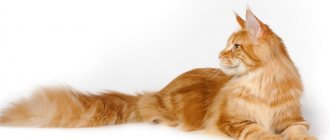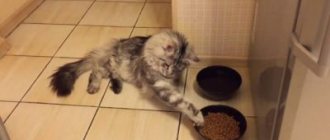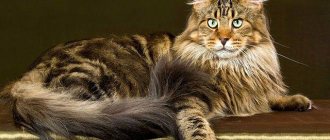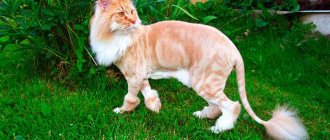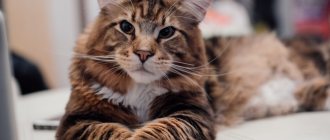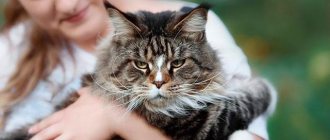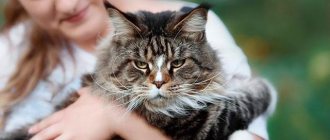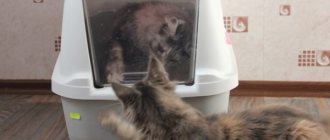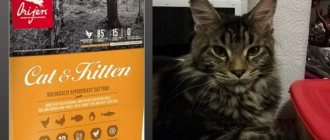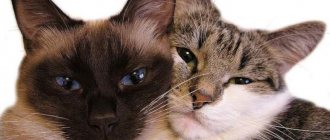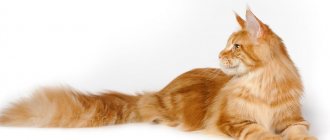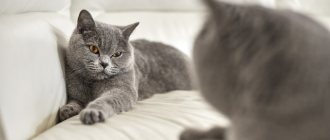Maine Coons are freedom-loving and independent animals, which is why many people believe that they cannot be trained. This is not entirely true - the standard process of education and training applied to dogs simply does not suit Maine Coons. These cats are smart, sociable and have a stable psyche, so all that is required from the owner is to find the right approach to raising a pet.
Education at home
Maine Coons are not unteachable animals, but in order for a small kitten to grow up to be an obedient pet, it needs to be raised from an early age. The breeders in the nursery are also involved in training the litter box and scratching post, where the kitten begins to socialize. After the Maine Coon moves to a new home, the owner needs to clearly define the boundaries of what is permitted for the pet and patiently explain to him the rules of behavior.
What is allowed to a kitten will also be allowed to an adult animal: it is almost impossible to wean an adult Maine Coon from anything.
The easiest way to find a common language with your pet is to use the method of prohibitions and rewards. With correct behavior on the part of the owner, raising a Maine Coon becomes not a routine, but an exciting activity.
How to interpret Maine Coon sounds
Owners of Maine Coons have long noticed that the animals have an unusually soft and soothing timbre of their voices. Depending on the situation, the sounds that the pet makes can decrease or increase, but they are extremely rarely harsh and unpleasant to the ear. A cat's meow can mean the following:
- A relaxed, quiet meow in a low range that turns into a purr - the Maine Coon is calm and shows satisfaction.
- Increased tessitura and the appearance of tense intonations - the cat attracts attention, but is not irritated.
- The sharp guttural sound that the Maine Coon makes in a monotonous, drawn-out howl is a demand for something and internal tension. If at the same time the cat presses its ears to its head, crouches on its front legs and taps its tail, then this may be a sign of preparation for an attack.
- Unpleasant vocal roulades that move from the lower range to the upper and back - defense of territory, sexual hunting.
- Growling - protection, warning of attack.
- A constant monotonous lingering sound – pain, stress, excitement.
The habits of each animal form its own sound marks. It has been established that the Maine Coon changes its tone depending on age - by the age of 4-5 years, its voice becomes lower and muffled.
But the size of the cat does not affect the timbre of the voice. Sometimes a large Maine Coon (about 1 meter in length and up to 45 cm in height) demonstrates a thin voice and even breaks into falsetto, while its smaller relatives have a pleasant, hoarse cat-like baritone.
Differences between males and females are another aspect of the manifestation of vocal abilities in cats. The former periodically produce more abrupt and clear passages, while the latter prefer long roulades. It is noteworthy that a sound similar to an animal growl can be heard more often from cats than from Maine Coon cats. Experts attribute this to the need to protect the offspring and scare away uninvited guests from the kittens.
This is interesting! Unlike dogs, which can bark for no reason, a cat never meows for no reason or for a stranger (except in cases of aggression). Her call is always addressed to the owner and must be paid attention to.
Common problems
The main problems that you may encounter when raising a Maine Coon and how to solve them:
- The cat goes to the toilet in the wrong place - sit the pet next to a puddle, sternly say “No!”, and then take him to the litter box.
- The Maine Coon climbs into places where it is forbidden, for example, on a table - spray water into it from a spray bottle. This action is unpleasant for the cat; it will serve as a kind of stop signal.
- The pet scratches the furniture, ruins the curtains with its claws - use a spray bottle, sternly say “No!”
Also often noted is the tendency of Maine Coons to chew on wires, which can be not only unpleasant, but also dangerous due to the risk of a short circuit. If it is impossible to hide the wiring, you should spray it with citrus juice - this smell is unpleasant for cats.
Main character traits
The serious appearance evokes respect and even wariness towards this breed. However, all these prejudices are completely groundless. Under the guise of a formidable hunter hides a kind soul and a calm disposition. You can often hear that coons are atypical felines. This refers to their behavior and habits. The main differences of this cat breed are the lack of selfishness and dislike of loneliness. By themselves, such cats do not like to spend time.
Attitude towards the owner
Maine Coons are very sociable, they love to spend time with their owners, without showing any aggression towards them. As a rule, they choose the main owner for themselves and perceive him as the head of their pride. You should not leave them alone for a long period. Maine Coons try to spend all their time next to a person, but they will not impose themselves. These animals cannot stand familiarity.
Maine Coon and children
These cats become strongly attached to children, to those who often play with them and take care of them.
They behave kindly and friendly with the child, a little condescendingly. When the baby begins to crawl and walk, the cat's behavior may change. She may begin to play with him, and sometimes even show protectiveness.
The Maine Coon's activity and friendliness make him a great friend. However, we must not forget that this is still a cat and not a soft toy. He has both claws and teeth.
The task of parents is to teach children to communicate safely with animals. A cat may become aggressive if it is hit, pulled by the tail, or thrown with any objects. But it is not typical for Maine Coons to attack children first.
Attitude towards other animals
The size of the coon allows him to have his own dignity over humans and other animals, including dogs. Because of their friendliness and ability to make contact, they easily get along with the pets they live in the same apartment and form friendly families. Coon cats are willingly involved in caring for their kittens, which is not typical for cats of most other breeds.
"Like a cat and a dog."
Who is the Maine Coon suitable for?
This breed is suitable for almost all people. But you shouldn’t expect excessive tenderness from them. Coons will not sit on laps, and given its size, this is not entirely comfortable for humans. You need to play and spend a lot of time with a cat. Coons are social animals that cannot tolerate loneliness and boredom; those who are constantly on the road should not get them.
Training and communication
Maine Coons are freedom-loving and independent, so you should not expect unquestioning obedience from them. However, this breed can be taught some commands and, more importantly, proper behavior around the house. First of all, it is necessary for the pet to remember its name and associate it with something pleasant, after which more intensive training should begin.
The most suitable way for Maine Coons to learn and consolidate skills is through play.
You need to take a closer look at your pet and understand what he likes - every cat has favorite activities and individual inclinations.
It is with the development of these talents and inclinations that it is worth starting, consolidating successes with affection and delicacies. One of the characteristics of Maine Coons is hunting for various objects. They love to carry toys in their teeth and often bring them to their owner’s feet, hinting at a desire to play. This trait can be developed and your pet can be taught to fetch thrown objects on command.
Another common command for training Maine Coons is to give the paw. To do this, you first need to carefully lift the paw of a sitting cat, making sure to accompany your actions with the command “Give me your paw” and treating the animal with a treat. Then you should extend your palm, repeat the command and reward the pet if it is completed. If the cat does not respond to the command, the training should be repeated from the beginning, gradually strengthening the skill.
This is prohibited
It will not be possible to avoid absolutely all problems when raising a pet, since each Maine Coon is unique, and it is impossible to foresee everything in advance. It is important to know the basic principles of behavior in case of problems and adhere to them:
- The use of physical force is prohibited. You cannot hit a kitten with your hand or any other object; this will lead to the fact that it will not only grow up to be a fearful cat with an unstable psyche, but will also begin to see its owner as an enemy.
- You cannot punish for something that was done a long time ago. If the consequences of a pet’s prank were not detected immediately, then there is no point in scolding him a few hours later - he will not understand what caused the owner’s dissatisfaction.
- Praise more than punish. The kitten should be praised and encouraged even for the most insignificant successes, but scolded only for serious offenses.
It is important for Maine Coons to understand and feel that the owner is, first of all, a friend. In this case, cats try their best to please the owner.
Temperament and aggressive behavior
The type of Maine Coon's temperament determines exactly how it will react to external stimuli. Among the representatives of this breed, sanguine and phlegmatic people are most often found. Both types have no problems with adaptation; they easily get used to new places and people. Inexperienced breeders find it a little more difficult to deal with choleric cats due to their hyperactivity and frequent mood swings.
A kitten is born with a certain temperament, which cannot be changed, but any cat can be trained to behave correctly.
Aggressive behavior can occur in the following situations:
- Disease. Often, when cats are ill, they do not hide in a secluded place, but try to show the owner that they feel bad and often do this by showing aggression.
- A game . Harmless games of kittens, during which they bite each other or the owner, over time can become a bad habit, which is why the Maine Coon will prove its leadership or achieve what it wants by behaving aggressively.
- Fear . A frightened animal seeks first of all to protect itself, and in such a situation, aggression and attack are the only suitable behavior options for a cat.
Also, representatives of this breed are prone to aggression when irritated, in case of violation of the boundaries of their territory and when clarifying relationships between several individuals.
Hisses
Hissing is most often a protective reaction of a cat to an external stimulus. Thus, a cornered animal, feeling threatened by a person or frightened by something, prepares to defend itself by hissing to warn of a possible attack. You should leave the Maine Coon alone and give him time to calm down and come to his senses. Later, you need to analyze the animal’s behavior, understand what provoked such a reaction and, if possible, get rid of the irritants.
Bites
Most often, the Maine Coon bites during the change of teeth and during puberty. In some individuals this habit goes away as they grow older, in others it does not. Therefore, before buying a kitten, you should find out about its parents and their temperament in order to have an idea of \u200b\u200bheredity and avoid buying an inadequate animal.
To wean your Maine Coon from biting, you need to:
- Buy your pet special treats that he can and should chew on.
- It is easy to shake the cat by holding it by the withers.
- Allowing the kitten to play as much as he wants, wasting his energy reserves.
- Ignore the Maine Coon for 20-30 minutes after the punishment.
You cannot hurt or injure your pet; all methods used must only affect the cat psychologically.
It is also important to ensure that the Maine Coon’s diet is balanced – a lack of vitamins and microelements leads to health problems, which also affects behavior.
Scratched
The only thing that a Maine Coon can and should scratch is a scratching post; if it is not there, the cat will find another object on which to sharpen its claws.
If a Maine Coon scratches its owner, it must be stopped immediately, letting him know who is the leader in the house.
First of all, you need to make it a rule that you can play with a kitten only with the help of sticks, strings and other toys, and not with your hands and feet. In cases where scratching is not the result of play, but a manifestation of aggression, you should punish the Maine Coon by spraying water on it, lightly hitting it on the nose, or pressing it to the floor or sofa until it calms down.
Meows constantly
Meowing is the Maine Coon's way of attracting the attention of its owner. In this way, the cat informs the owner about his desires or fears, attracts his attention, or simply communicates.
If your Maine Coon meows constantly, you need to:
- Make sure your pet is healthy and fed. If you suspect any disease, you need to contact a veterinarian, and if the cat is hungry, feed it, possibly increasing the portion size, and provide constant access to clean drinking water.
- Ignore. Often the animal simply sees a connection between meowing and the owner’s immediate reaction to it, so it uses this technique to attract attention. If the Maine Coon is healthy and well-fed, you should simply stop reacting to his meowing.
- Punish. Physical punishment is not acceptable, but you can spray the cat with warm water from a spray bottle or blow on his face.
To prevent night meowing, you need to play with your Maine Coon before going to bed, giving him the opportunity to get rid of accumulated energy, and feed him. All this will help your pet calm down and get ready for rest and sleep.
You should not hit a cat or yell at it - this will frighten the animal and cause other behavior problems.
Aggression in kittens
An affectionate and gentle creature eventually turns into a restless teenager. Small animals learn about the world by testing things out. During the first month, a Maine Coon grows up with its mother and brothers and sisters. They play, biting each other, catching the tail, and the cat teaches them how to hunt and how to stand up for themselves.
When a change of teeth occurs, the owner is guaranteed to have damaged things and barely noticeable wounds. You can teach him to chew special toys, give him small natural sinews, and treats. Then the kitten switches attention, and the process of education begins.
Most often, children's feet suffer from playing. Not everyone goes through this when they grow up, because character and temperament are passed on from their parents. Hyperactivity is a sign of good health and proper development. The kitten learns to interact, tries different forms of communication. He repeats the pattern of behavior in the pride, attacks from secluded places, supposedly tracking down prey.
The older Maine Coon calms down, but puberty brings back excitement and elements of aggression. Castration saves you from possible consequences, since hormones do not give the desired effect. Cats usually outgrow them; a mature individual rarely bites, mainly when he is playing or is sick.
To wean yourself from this habit, experts recommend:
- Do not use arms, legs, or other parts of the body in the game.
- Provide your pet with a variety of toys made from fur, veins, and feathers.
- Punish by lightly shaking the scruff of the neck, as a mother cat does.
- Do not limit the baby's activity.
- Take kittens from the breeders' home after 3 months so that the kitten can communicate correctly with peers and people.
- Balance your diet.
A lack of calcium, for example, disrupts the transmission of nerve impulses. Sunlight promotes the production of vitamin D, which is responsible for growth, bones and cartilage. A kitten with a lack of trace elements will develop health problems, which will affect their behavior.
